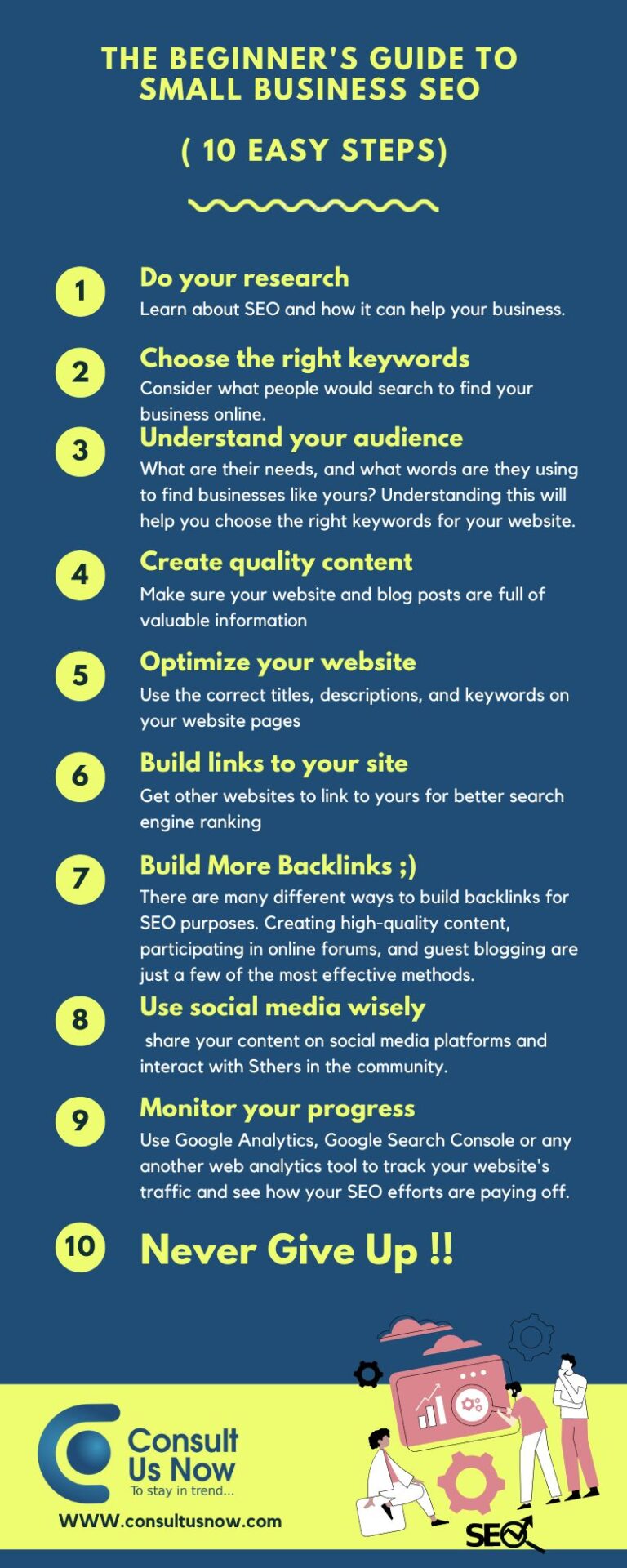
The Beginner's Guide to Small Business SEO ( 10 Easy Steps)
Table of content
Introduction
SEO might seem confusing to a small business owner who isn’t familiar with what should be done so clients can find their business.We often find small business owners (and large) wasting money on ineffective, questionable or outright shady marketing campaigns.
This guide will walk you through all the fundamentals of SEO (what it is, why it’s important, what to look for, etc.) and give you 10 simple and easy tips on how to start your business’ search engine optimization.
Let’s get started.
Top 10 Easy Steps to Small Business SEO
1. Do your research - learn about SEO and how it can help your business.
Search engine optimization (SEO) is the process of improving your website so that search engines like Google (and others) will rank your site higher on their results pages. This can translate into more visitors to your site, which can help you generate more sales.
SEO is not an overnight process. It takes time, patience, and effort to see the results of your efforts. But the benefits are worth it — according to one estimate, SEO can boost traffic by up to 50 percent.
Here are some things you should know about SEO:
What is SEO?
SEO is the process of optimizing your website content for search engines so that people who search for relevant information will find it easily on Google or other search engines.
How do I optimize my site for SEO?
To optimize a website for SEO, you need to create high-quality content that reflects what people are searching for online and is relevant to their interests. You also need to use keywords that have high search volume and low competition in your writing — this helps improve visibility on Google’s results page. Additionally, you should ensure that your website loads quickly and has minimal errors that could trigger 404 errors.
If you want any support for your Small Business SEO, You can contact our SEO agency!!
2. Choose the right keywords

3. Understand your audience
Research What are their needs, and what words are they using to find businesses like yours. Understanding this will help you choose the right keywords for your website.
When writing for the web, it’s important to know your audience and what they need.
For example, if you’re a travel agent, your audience is people planning to go on a trip. They might be looking for information about where to go or how to get there. They could also be trying to find a place to stay when they arrive.
If you’re writing a blog post about the best places in Europe to visit this summer, then you know your audience is people who want to travel there this summer and need some advice on where they should go.
It’s also worth knowing what words they use when searching online. If you want them to find your business, then it’s important!
4. Create quality content
Make sure your website and blog posts are full of valuable information
The content on your website and blog is the most important thing to your online presence. It’s what will get people to stay on your site, and it’s what will convince them to buy from you. So your website must have a blog.
Here are some tips for creating quality content:
Be helpful. Your content should answer people’s questions about your products or services or teach them something new about them. If you try to sell something in every blog post, it will come off as sleazy and pushy — not the kind of thing that makes people want to buy from you.
Make sure the information on your site is accurate and up-to-date. People will stop coming back if they feel they can’t trust what they’re reading on your site.
5. Optimize your website
Use the correct titles, descriptions, and keywords on your website pages
The first step in optimizing your web page is ensuring it has the correct title tag and meta description.
The title tag appears in search results and on social media platforms when your business’s name or product is mentioned. It should be as short as possible and include keywords describing what people are searching for.
The meta description is a snippet of text that appears under the title tag when people search for your business online. The meta description should be 150 characters or less and include keywords people are searching for. Make sure to include a link to your website at the end!
6. Build links to your site
Get other websites to link to yours for better search engine ranking.
Link building is the process of making other people’s websites link to yours. When someone links to your website, it’s called a backlink.
You can build links in many ways – here are some examples:
Write guest posts for other websites and include a link back to your site in the author bio. This is one of the easiest ways to build links because you don’t have to do any work other than writing the article and submitting it for publication on another site.
Add relevant links on social media profiles. This includes sharing other people’s content and adding a short description like “this article was helpful” or “this product is great.”
Share relevant content on social media platforms like Facebook groups and pages or LinkedIn groups. When people see that you’re sharing useful information, they’ll be more likely to click through and check out your website.
7. Build More Backlinks
There are many different ways to build backlinks for SEO purposes. Creating high-quality content, participating in online forums, and guest blogging are just a few of the most effective methods.
Backlinks are one of the most important factors to consider when trying to rank highly on search engines. A good backlink strategy will help you build a strong foundation for your website and provide you with a way to increase traffic over time.
There are many different ways to build backlinks for SEO purposes. Creating high-quality content, participating in online forums, and guest blogging are just a few of the most effective methods.
To build quality backlinks, you must first understand what they are and how they work.
Backlinks are links that point to your website from other websites on the internet. When Google or other search engines crawl your website, they will see these links as votes of confidence from other webmasters who have chosen to link to you. When they see this, they’ll be more likely to rank your site higher than others in their results pages because they’re showing that it’s popular among other people online.
The best way to find quality sites is by using free tools like Majestic or Ahrefs that allow you to see which websites are linking to your competitors and how many links each site has pointed towards it.
8. Use social media wisely
share your content on social media platforms and interact with others in the community.
Social media is a powerful tool for marketing your business. You can use it to share your content, interact with others in the community and build relationships with potential customers.
To get the most out of social media, follow these tips:
Participate in conversations. Social media is about engaging with other people, so make sure you are joining conversations and responding to comments. This will help you build trust and credibility with your audience and provide a better experience for them.
Use relevant hashtags on Twitter and Instagram posts. Hashtags are words or phrases preceded by a hash sign (also known as a pound sign) that allows users to search for content related to that hashtag. They are used on most social networks, including Facebook, Twitter and Instagram. For example, if you wanted to find posts about football games in Chicago, Illinois, you could search for #Hawks or #Cubs. The more people use a particular hashtag on their own posts, the more popular it becomes and gets listed on other people’s feeds more frequently.
Post regularly but not too often – posting too much can annoy followers who don’t want their feeds filled up with the information they don’t care about or won’t read through all of it anyway! Once or twice a day is fine for the right amount of posting on social media.
9. Monitor your progress
Use Google Analytics, Google Search Console or any another web analytics tool to track your website’s traffic and see how your SEO efforts are paying off.
There are many ways to measure your SEO progress, but the most important thing is that you’re able to track your progress and make adjustments as necessary.
If you’re not sure where to start, here are some tips for measuring SEO success:
Set goals – Set specific goals that represent what success means for you and your company. Examples might include increasing traffic by 10% or increasing conversion rates by 5%.
Measure performance – Use Google Analytics or another web analytics tool to track how well your website performs against these goals over time. This will allow you to adjust and fine-tune as necessary until you reach your desired goals.
10. Never give up
Conclusion
Search engine optimization isn’t something you can do yourself, but the services of an experienced professional don’t necessarily have to break the bank.
We ConsultUsNow are the right small business SEO company for your needs and your budget.
Remember: SEO is only one piece of your marketing puzzle—you also need to plan your social media strategy and overall digital marketing approach. But if you’re starting from scratch, it’s useful to begin with, a solid SEO strategy so that you don’t get lost along the way.
For further details or support in Digital Marketing, Write to [email protected] or call us at +91 6374602829
